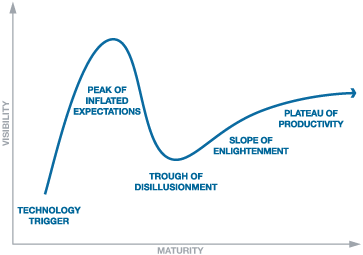
Parsing Big Data’s Big Hype
In recent days, a number of high-profile voices have raised questions about whether big data is worth your time or the attention it's getting. Is there too much hype, or is there really something there?
We may be reaching a peak when it comes to big data.
Why’s that? Well, based on a number of recent columns, the concept—which relies on the discovery of actionable intelligence from the vast troves of data already being collected—is starting to get some serious haters.
Among them:
It’s true that big data probably needs a little air let out of its bubble. The term is heavily used, but few understand it fully.
The New York Times: In a news analysis piece for the paper, investigative reporter James Glanz suggests that the concept doesn’t hold the economic promise long claimed. “For its next act, the [technology] industry has pinned its hopes, and its colossal public relations machine, on the power of big data itself to supercharge the economy,” Glanz writes. “There is just one tiny problem: The economy is, at best, in the doldrums and has stayed there during the latest surge in web traffic.”
The Washington Post: In an op-ed for the newspaper, applied mathematician and scholar Samuel Arbesman explains what the concept actually is by pointing out some of the more prevalent myths about it. The piece, written in a deflating tone, is best exemplified by this sentence: “If you want more precise advertising directed toward you, then yes, big data is revolutionary. Generally, though, it’s likely to have a modest and gradual impact on our lives.”
Gartner: One of the lead bullet points in the research firm’s 2013 Hype Cycle Special Report is a claim that big data is reaching what it calls the “peak of inflated expectations” and is about to fall into the “trough of disillusionment.” AllThingsD’s Arik Hesseldahl, parsing Gartner’s results, suggests that the technology needs a high-profile failure before the backlash starts. “If big data is indeed due for a drop into the trough of the typical hype-cycle path, it would mean that early trials of pilot projects would have to fail to deliver on expected benefits,” he writes. “That hasn’t happened yet.”
What to make of all of this negativity, anyway?
Overhyped, but Not All Hype
It’s true that big data probably needs a little air let out of its bubble. The term is heavily used, but few understand it fully.
Even the companies that do take advantage of consumer data face challenges in implementation, as a recent study by the Direct Marketing Association and the Winterberry Group found: While many agree that this data is valuable, few have firm data governance policies in place to safeguard it.
And despite the negative press that the concept has gotten, some argue that big data critics are missing the big picture.
In a blog post responding to the Times piece, GigaOm’s Derrick Harris (who writes mostly on big-data issues) offers a defense of the concept, suggesting that Glanz’s arguments are shortsighted for a few reasons, among them that big data isn’t limited to consumer data and that it isn’t limited to the web. The truth, Harris argues, is that there’s more to the technology, and industries need more time to figure it out. He does concede one thing: It’s probably overhyped. “Anyone now getting upset that big data isn’t a perfect set of technologies and methodologies probably wasn’t paying much attention to what experts have been saying for years,” he notes. “But being overhyped now doesn’t mean big data can’t have a significant impact over time.”
There are certainly success stories—the Alzheimer’s Association, for example, has used big data to startling effect in researching the disease. And as Harris points out, Barack Obama’s presidential campaigns mastered the approach in 2008 and 2012.
Maybe, in the end, big data just needs a little bit more time in the Hype Cycle before it’s taken seriously. Note below that Gartner’s “trough of disillusionment” has a couple more steps after it.

Think we’ll ever get to the “plateau of productivity” with big data? Let us know your take in the comments.
(Hemera/Thinkstock)






Comments